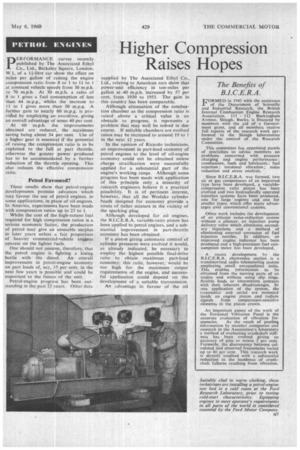PETROL ENGINES
Page 121

If you've noticed an error in this article please click here to report it so we can fix it.
pERFOR MANCE curves recently published by The Associated Ethyl Co., Ltd., Berkeley Square, London. W.1, of a li-litre car show the effect on miles per gallon of raising the engine compression ratio from 8 to 1 to 11 to I at constant vehicle speeds from 30 m.p.h. to 70 m.p.h. At 30 m.p.h. a ratio of 8 to 1 gives a fuel consumption of less than 44 m.p.g., whilst the increase to II to 1 gives more than 50 m.p.g. A further gain to nearly 60 m.p.g. is provided by employing an overdrive, giving an overall advantage of some 40 per cent.
At 60 m.p.h. the improvements obtained are reduced, the maximum saving being about 34 per cent. Use of a higher gear is essential if the potential of raising the compression ratio is to be exploited to the full at part throttle, otherwise the greater power produced has to be accommodated by a further reduction of the throttle opening. This also reduces the effective compression ratio.
Petrol Favoured?
These results show that petrol-engine developments promise advances which may favour the use of petrol engines, in some applications, in place of oil engines. In America, experiments have been made with compression ratios up to 25 to 1.
Whilst the cost of the high-octane fuel required for high compression ratios is a serious economic factor, the production of petrol may give an unusable surplus in later years unless a fair proportion of heavier commercial-vehicle engines operate on the lighter fuels.
One should not assume, therefore, that the petrol engine is fighting a losing battle with the diesel. An overall improvement in petrol-engine economy on part loads of, say, 35 per cent, in the next few years is possible and 'could be important to the future of the unit.
Petrol-engine progress has been outstanding in the past 25 years. Other data




































































































































































































































































